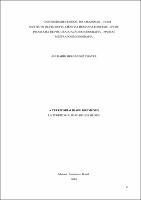| ???jsp.display-item.social.title??? |


|
Please use this identifier to cite or link to this item:
https://tede.ufam.edu.br/handle/tede/7554Full metadata record
| DC Field | Value | Language |
|---|---|---|
| dc.creator | Chávez, Ani Darío Hernández | - |
| dc.creator.Lattes | http://lattes.cnpq.br/1457822076033420 | por |
| dc.contributor.advisor1 | Faria, Ivani Ferreira de | - |
| dc.contributor.advisor1Lattes | http://lattes.cnpq.br/9910677483036522 | por |
| dc.contributor.referee1 | Pereira, Denis da Silva | - |
| dc.contributor.referee1Lattes | http://lattes.cnpq.br/3847755085995362 | por |
| dc.contributor.referee2 | Santana, Paola Verri de | - |
| dc.contributor.referee2Lattes | http://lattes.cnpq.br/4991014556040442 | por |
| dc.date.issued | 2019-09-16 | - |
| dc.identifier.citation | CHÁVES, Ani Darío Hernández. A territorialidade dos muxes. 2019. 157 f. Dissertação (Mestrado em Geografia) - Universidade Federal do Amazonas, Manaus, 2019. | por |
| dc.identifier.uri | https://tede.ufam.edu.br/handle/tede/7554 | - |
| dc.description.resumo | Con este estudio se logro conocer y comprender la territorialidad de los muxes desde un campo más amplio. Conocer sobre los muxes en la actualidad ya no es un mito, ya que este grupo de personas esta considerado como el tercer género en Oaxaca, México. Para lograr esta investigación se hicieron trabajos de campo y de reconocimiento del territorio en los limites de Juchitán y Santo Domigo de Tehuantepec, se realizo con la ayuda de muxes que formaron parte de un grupo de apoyo para el registro de testimonios relacionados al como se vive dia dia en esta región. Todo este trabajo se dio con respeto y con una mente abierta a las propias formas de pensar y de expresarse de los muxes, donde se dio la atención como sujetos y no como objetos, eso ayudo a conseguir de una forma amable y precisa, toda la información que se necesitaba para lograr dicha investigación de una forma intercultural y con fundamentación en la ecología de los saberes. El actuar, pensar y utilizar metodologías participantes y colectivas respetando su propia cosmología, fue fundamental para la promoción de la autonomía, cuando la diferencia es puesta de forma positiva y no como atraso o inferioridad, y así: se consiguió fortalecer su identidad y hacer notorias sus tradiciones, costumbres, folklore y cultura que por naturaleza les pertenece y que inatamente profesan; y que asi mismo se observa una convivencia armónica y de respeto, con fin de contribuir al mismo tiempo los muxes y el grupo étnico zapoteco a nivel local y regional. | por |
| dc.description.abstract | With this study it was possible to know and understand the territoriality of the muxes from a wider field. Knowing about muxes today is no longer a myth, since this group of people is considered the third gender in Oaxaca, Mexico. In order to achieve this research, field work and recognition of the territory in the limits of Juchitán and Santo Domigo de Tehuantepec were carried out with the help of muxes who formed part of a support group for the recording of testimonies related to how people live every day in this region. All this work was given with respect and with an open mind to the own ways of thinking and expressing themselves of the muxes, where the attention was given as subjects and not as objects, that helped to obtain in a kind and precise way, all the information that was needed to achieve this research in an intercultural way and based on the ecology of knowledge. Acting, thinking and using participating and collective methodologies respecting their own cosmology, was fundamental for the promotion of autonomy, when the difference is put in a positive way and not as backwardness or inferiority, and thus: we managed to strengthen their identity and make their traditions, customs, folklore and culture notorious that by nature belongs to them and that they profess inatamente, and that also observes a harmonious coexistence and respect, in order to contribute at the same time the muxes and the zapotec ethnic group at the local and regional level. | eng |
| dc.description.sponsorship | CAPES - Coordenação de Aperfeiçoamento de Pessoal de Nível Superior | por |
| dc.format | application/pdf | * |
| dc.thumbnail.url | https://tede.ufam.edu.br//retrieve/35929/Disserta%c3%a7%c3%a3o_AniDarioChaves_PPGEOG.pdf.jpg | * |
| dc.language | spa | por |
| dc.publisher | Universidade Federal do Amazonas | por |
| dc.publisher.department | Instituto de Filosofia, Ciências Humanas e Sociais | por |
| dc.publisher.country | Brasil | por |
| dc.publisher.initials | UFAM | por |
| dc.publisher.program | Programa de Pós-graduação em Geografia | por |
| dc.rights | Acesso Aberto | por |
| dc.subject | Territorialidade humana | por |
| dc.subject | Identidade de gênero | por |
| dc.subject.cnpq | CIÊNCIAS HUMANAS: GEOGRAFIA | por |
| dc.title | A territorialidade dos muxes | por |
| dc.type | Dissertação | por |
| dc.subject.user | Territorio | spa |
| dc.subject.user | Interculturalidad | por |
| dc.subject.user | Género | por |
| dc.subject.user | Muxe | por |
| Appears in Collections: | Mestrado em Geografia | |
Files in This Item:
| File | Description | Size | Format | |
|---|---|---|---|---|
| Dissertação_AniDarioChaves_PPGEOG.pdf | 2.12 MB | Adobe PDF |  Download/Open Preview |
Items in DSpace are protected by copyright, with all rights reserved, unless otherwise indicated.




